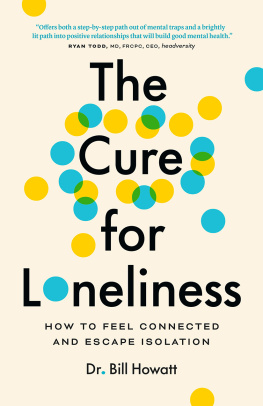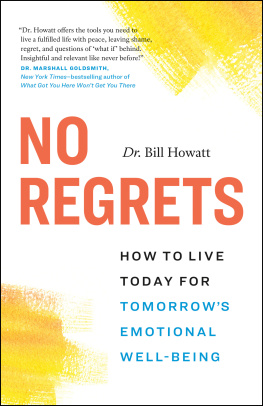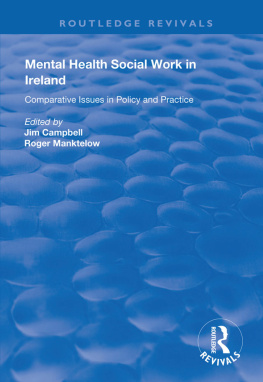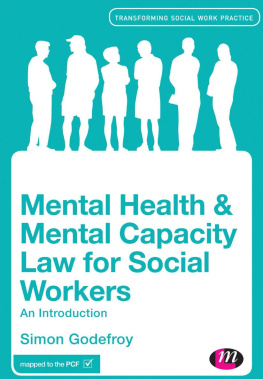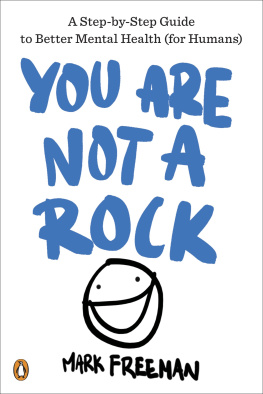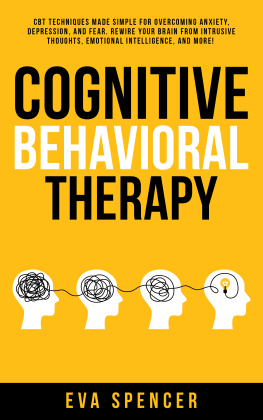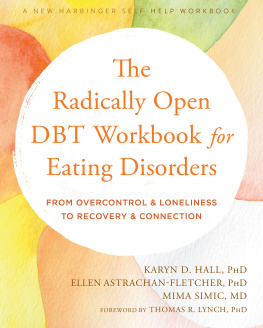Copyright 2021 by Dr. William A. Howatt
All rights reserved. No part of this book may be reproduced, stored in a retrieval system or transmitted, in any form or by any means, without the prior written consent of the publisher or a licence from The Canadian Copyright Licensing Agency (Access Copyright). For a copyright licence, visit accesscopyright.ca or call toll free to 1-800-893-5777.
Some names and identifying details have been changed to protect the privacy of individuals.
This book is not intended as a replacement for therapy or as a substitute for the medical advice of physicians; its designed to leverage techniques that can promote positive mental health. The reader should regularly consult a physician in matters relating to their health and particularly with respect to any symptoms that may require diagnosis or medical attention. The exercises in this book leverage the cognitive-behavioural approach. If engaging in any of these exercises creates more stress and strain, stop and seek professional support (e.g., call your local mental health agency, crisis line, employee and family assistance office, or 911).
Cataloguing in publication information is available from Library and Archives Canada.
ISBN 978-1-77458-000-4 (paperback)
ISBN 978-1-77458-056-1 (ebook)
Page Two
pagetwo.com
Edited by Amanda Lewis and Al Kingsbury
Copyedited by Crissy Calhoun
Proofread by Alison Strobel
Cover design by Taysia Louie
Interior design by Setareh Ashrafologhalai
Ebook by Bright Wing Media
Printed and bound in Canada by Friesens
Distributed in Canada by Raincoast Books
Distributed in the US and internationally by Publishers Group West, a division of Ingram
21 22 23 24 25 5 4 3 2 1
billhowatt.com
To all my authentic connections ( AC s),
you know who you are
To my mom, whom I lost during the COVID - 19 pandemic
and who helped me face the challenges of life
To LMN , who inspired me to write this
book and is one of my most significant AC s
Introduction
You never let a serious crisis go to waste. And what I mean by that is its an opportunity to do things you think you could not do before.
Rahm Emanuel
O n March , 2020, I was in Edmonton to give a talk on psychological safety in the workplace. The threat of COVID - 19 was increasing, and engagement cancellations started. Within hours, many of my speaking events for the coming weeks were off my calendar. I was in disbelief. Within a few days, all my talks for April and May were cancelled.
My employer, the Conference Board of Canada ( CBOC ), moved quickly to respond to the pandemic. We decided to start working remotely, and we created a COVID - 19 landing page to share economic insights, relevant research, and my mental health video blog. Being an expert in mental health, I wanted to help people get through this crisis.
Canadians began learning the importance of social distancing and social isolation. I never liked the term social distancing. In fact, in one of my early video blogs I called it physical distancing because while we wanted people to stay apart, we wanted them to stay connected socially.
On March 20, after five days in isolation in my townhouse in Ottawa, the magnitude of what was happening hit me. I was witnessing so much fear and concern around isolation and loneliness. I didnt go to bed with a plan, but when I woke up, I made a commitment to write this book. Theres nothing like a pandemic to clarify a need for action.
Before COVID - 19, isolation and loneliness were already challenges for a significant percentage of the population. In 2019, studies reported that one in five Canadians identified as lonely.
All humans have a genetic need to be socially connected, and we benefit from all types of social connections from informal to formal, from a simple smile from a stranger at a grocery store to a hug from a relative or close friend. All social connections, whether slight or intimate, help us feel connected to other humans.
We hear a lot about maintaining relationships, but what if relationship management is not the biggest social connection problem? Perhaps its the absence of meaningful social connections in the first place.
What matters is that we value our social connections. When we dont have social connections we value, we have social connections gaps. Those gaps result in feelings of isolation and loneliness.
The Effects of Loneliness
Authentic connections are grounded in mutual respect, where both parties benefit. Its these types of relationships, when built into our personal and professional lives, that provide a feeling of social connection. The more authentic connections we have, the less likely well experience gaps in social connections. However, having just one authentic connection can mean the difference between happiness and loneliness.
When a person perceives theyre socially isolated and lonely, their mental health and well-being are strained. Theres evidence that links a lack of social support to poor mental health, as well as poor physical health outcomes, including cancer and infectious diseases.
Loneliness has been linked to depression, anxiety, irritability, and even suicide.
As I researched the effects of social connections gaps, I discovered lots of papers on the negative impact that isolation and loneliness can have on the population. The United Kingdom created a Minister for Loneliness position because of the research linking loneliness to premature death.
A person experiencing loneliness can be more distracted, which may put them at increased risk of:
Interestingly, these risks are also found in a person experiencing high levels of stress. Loneliness is stressful. The absence of meaningful social connections in your family, community, and work life can be painful. Whether experienced in one or all areas of life, loneliness can create challenges that strain your mental health.
Simply put, social connections are good for our health. Learning to close social connections gaps and build social connections with people you feel psychologically safe around and share experiences with will support your mental health in particular.
If you want to bake a cake, you require specific ingredients. If you want to bake happiness into your life, you need strong and healthy social connections. Think about it: If you could close one social connections gap immediately, which one would it be? Why did you pick this one, and what do you believe it will give you?
Sometimes a person may not be able to even name what theyre experiencing as isolation or loneliness. All they know is they dont feel good or happy. The COVID - 19 pandemic has a silver lining: it brought social connections gaps, isolation, and loneliness into the mainstream conversation. Education is important, and the more we can talk about isolation and loneliness, the more we can all learn what it is and what we can do about it.
Four Pillars for Mental Health
Most people know the simple formula for success in physical health. If you want to lose weight, for instance, you need to increase your exercise and decrease your caloric intake. Whats left is making a free choice to value and do those actions that promote good physical health. The same is true for promoting your mental health.
In my work prior to the COVID - 19 pandemic, I spent a lot of energy focusing on resiliency and coping skills. In my talks, I showed what stress and strained mental health look like in the workplace in particular and offered strategies for escaping the ruts that keep us stuck. Thinking about social connections impact, I created a model for mental health, consisting of four pillars:
Next page
